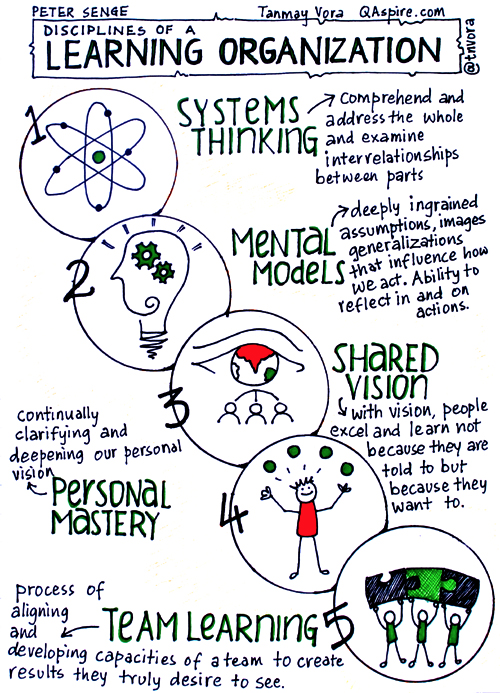An Org Change Practitioner's Learning Regimen

Learning by doing has become widespread. Screw reading a textbook and just do stuff. Start your own business. Fail fast, fail often. Learn-by-doing is a sexy way to learn.
While there is arguably no better teacher than experience and reflection, my dominant learning style is reading/writing. I like information displayed as writing, I like lists of ideas, I emphasize text-based input and output, and I just plain enjoy doing both. The way I like to learn isn’t that sexy.
I first read a piece called Advice to a student by Niko Canner when I was a senior in college. Niko posits that a junior role in a consulting firm is demanding, and a great way to prepare for the job is investing 300–400 hours of focused time reading, learning, and applying the ways of thinking that a consultant would apply. The post really landed well with me at the time for two reasons: 1) as a former basketball player and a self-taught dancer I love the heck out of designing training regimens and 2) I was a graduating senior making a focused effort on landing a consulting job in organizational change/design/transformation.
Inspired by the regimen offered in the piece, I set myself on a path to read books that ranged from topics like organizations, coaching, strategy, and technology. Some books were amazing, but other books weren’t critical to learning how to do what I eventually wanted to do.
Looking back now as a current practitioner, I wanted to try a thought exercise on identifying which few books were most helpful to my continual learning about what it means to“do”organizational change. The goal of this exercise wouldn’t be a long list of books — anyone can make a long list of books and articles — but a short list of books that were most impactful to my journey and development. If I could give myself advice to my year-and-a-half ago self (or any aspiring organization designer), here’s a first stab at a reading regimen I would offer:
1. First, read about what productive and meaningful work looks like on an individual level.
Starting with reading books about the theory of org change is great, but I found it extremely practical to look at what good work looks like on an individual level. You can apply this stuff to anything immediately. Starting with the lens on the individual will equip you with techniques you can try now as you begin your journey learning about what it means to do this work.
Read Cal Newport’s Deep Work. This one is major. This will influence how you personally work for the rest of your life.
Read Essentialism to get a feel for why less is more in every way. The idea of focusing on what’s essential will apply to what you choose to prioritize yourself.
Read Adam Grant’s Give and Take to understand why successful individuals are givers, not takers, and how we can design institutions to encourage more giving behaviors.
2. Then, learn about why the way work is today isn’t working.
Most people would advise you to start with Holacracy or Team of Teams. I’d actually start with The Fifth Discipline. There’s nothing like a book that teaches you how classic these seemingly “new” ideas are. You’ll learn about very fundamental ideas you’ll be applying for the rest of your life: systems thinking, mental models, shared vision, personal mastery, and team learning.

Read Reinventing Organizations. What I found most valuable are thestories and case studies of what a better way of working looks like in lesser-known organizations. Finally, read Beyond Budgetingto get a sense of how organizational dysfunction is largely linked to the way organizations traditionally do budgets and incentivize individuals.
3. Then read about how to do this work.
Read Edgar Schein’s Process Consultation. This one is a must. You’ll learn why doing this work is more about asking questions than having answers, why ‘help’ is more defined by the person helped than by the helper, and how to solve the toughest solutions with others (not for others). Think about how the way you help others relates to the ten principles talked about in this book. Then write about it.
Read Lean Change Management. This book is practical and a quick read, and it will immediately apply the work you’ll do.
Read Leadership Team Coaching. Leading groups will be the heart of what you do and there is an emerging field called team coaching. Learn about it.
Read Patrick Lencioni’s Getting Naked. As an introvert, you’re not natural at selling so this book is important. Selling isn’t so much having a 50-page deck for your pitch meeting with a prospective client as it is just plain doing consulting with the prospective client from the get-go.
4. Lastly, up your business acumen.
You’re going to be advising folks with tons of experience in business, so you will need to learn how to speak their language. You don’t need an MBA to have a basic understanding of business — learning about business will come mostly from experience. But you can learn about business now by starting with this book:
Read What the CEO Wants You to Know to get an understanding of the basic economics of business. Then read a company’s annual report and understand their cash generation, margin, velocity, return on assets, and growth, and how these factors all interact.
These books do not have to be read in this order — follow where your curiosity takes you. Take moments to pause after reading to write about what you’re learning, and how you can see it being applied in organizations.
There are other books I’ve read that have been useful and should be on your radar to read in the future (like Work Rules!, Holacracy, Team of Teams, Teaming, Second Machine Age, Lords of Strategy, Thinking in Systems),but these books listed in the regimen have been most helpful in my journey and experience to date.
Nothing beats learning how to “do” organizational change more than actually doing it. But if you’re aspiring to do this work (and if your learning style isn’t sexy, just like mine) this learning regimen will set you off on a good start.
—
I love hearing from others about what they’re reading. Here’s what I’ve been reading recently. What’s the last book you’ve read? Let me know on Twitter.
